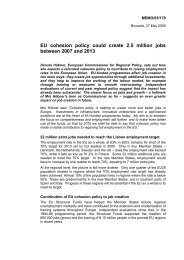Industrial Relations in Europe 2012 - European Commission - Europa
Industrial Relations in Europe 2012 - European Commission - Europa
Industrial Relations in Europe 2012 - European Commission - Europa
You also want an ePaper? Increase the reach of your titles
YUMPU automatically turns print PDFs into web optimized ePapers that Google loves.
employers. The second covers countries <strong>in</strong> which fiscal consolidation programmes are be<strong>in</strong>g<br />
implemented, and not just <strong>in</strong> those countries receiv<strong>in</strong>g f<strong>in</strong>ancial assistance from the <strong>Europe</strong>an<br />
Union and the International Monetary Fund. For countries hit by the debt crisis, fiscal<br />
consolidation, f<strong>in</strong>ancial stability and structural reforms are conditions to restore confidence,<br />
re-establish fiscal solvency and foster economic growth over the medium term. In these<br />
countries the measures are necessarily more severe than those taken by private companies<br />
dur<strong>in</strong>g the 2008-2010 recession.<br />
Sound public f<strong>in</strong>ances facilitate the ability of governments to carry out policies that are<br />
dist<strong>in</strong>guish<strong>in</strong>g elements of the <strong>Europe</strong>an Social Model such as the promotion of social<br />
cohesion and substantial f<strong>in</strong>anc<strong>in</strong>g for key public services such as health and education. Thus,<br />
many measures were designed to correct fiscal imbalances and to restore confidence of<br />
f<strong>in</strong>ancial markets <strong>in</strong> the capacity of national governments to undertake responsible and<br />
susta<strong>in</strong>able fiscal policies. In some countries, these measures <strong>in</strong>cluded reforms of collective<br />
barga<strong>in</strong><strong>in</strong>g systems where they were seen as part of the problems to be addressed. Even if the<br />
<strong>Commission</strong> has always stressed the importance of social dialogue, of the autonomy of social<br />
partners and of the respect for national circumstances and practices, reforms were not always<br />
accompanied by a fully effective social dialogue.<br />
These reforms have po<strong>in</strong>ted to the lack of flexibility of the classic tools of collective<br />
barga<strong>in</strong><strong>in</strong>g mechanisms and other systems for conflict prevention, such as <strong>in</strong>dexation and<br />
extension clauses. In such circumstances, there is little negotiat<strong>in</strong>g space for social dialogue<br />
to operate, and the more positive overall assessment of <strong>Industrial</strong> <strong>Relations</strong> <strong>in</strong> <strong>Europe</strong> 2010<br />
cannot be repeated for the subsequent period.<br />
The impact of the crisis on <strong>in</strong>dustrial relations <strong>in</strong> the public sector is severe, particularly for<br />
the trade unions. For some time now, the public sector has provided a core group of trade<br />
union members; trade union density <strong>in</strong> many Member States has been considerably higher <strong>in</strong><br />
the public than <strong>in</strong> the private sector, and the comb<strong>in</strong>ation of austerity policies lead<strong>in</strong>g to a<br />
shr<strong>in</strong>k<strong>in</strong>g public sector and demographic trends is likely to further reduce trade union density<br />
<strong>in</strong> services overall <strong>in</strong> the com<strong>in</strong>g years. As a result of the reforms <strong>in</strong> the public sector and the<br />
current conflictual environment, <strong>in</strong>dustrial relations <strong>in</strong> the public sector have almost certa<strong>in</strong>ly<br />
changed fundamentally.<br />
While recent trends <strong>in</strong> <strong>in</strong>dustrial relations across <strong>Europe</strong> are worry<strong>in</strong>g, the evidence is clear<br />
that well-structured social dialogue can produce positive outcomes and some of those are<br />
documented <strong>in</strong> this report. As was already the case <strong>in</strong> 2010, the countries where social<br />
dialogue is well-established and <strong>in</strong>dustrial relations <strong>in</strong>stitutions strong are still generally those<br />
where the economic and social situation is more resilient and under less pressure. This also<br />
reflects the historically path-dependent nature of <strong>in</strong>dustrial relations.<br />
This report argues that social dialogue mechanisms and <strong>in</strong>struments, which have served<br />
<strong>Europe</strong> well over many decades, are still relevant means of address<strong>in</strong>g the crisis and<br />
contribut<strong>in</strong>g to creat<strong>in</strong>g favourable conditions for growth and employment. Beyond all the<br />
diversity of national <strong>in</strong>dustrial relations systems, social dialogue is a key component of the<br />
<strong>Europe</strong>an social model and its vital role is recognised by the <strong>Europe</strong>an Treaties, <strong>in</strong>clud<strong>in</strong>g the<br />
8

















